
Credo Fellow Highlight: J. V. Fesko
Credo is Latin for “I believe.” From the creeds of the Church Fathers to the confessions of the Reformation, Christians have been faithful to confess the faith once for all delivered to the saints. Credo retrieves this classical and reformational heritage in order to create and cultivate theological renewal today. By bridging the gap between church and academy, Credo helps churchgoers, pastors, and students alike learn theology and retrieve orthodoxy for the sake of Christian fidelity today.
However, a team effort is required if the church and academy alike are to remain faithful to this orthodox faith, a team that spans denominations and brings together some of today’s most outstanding theologians, pastors, and writers. I am pleased to welcome the Credo Fellows, each of which embodies the spirit of Credo in their own teaching and writing ministries. Each week, we are highlighting one of the new fellows, allowing you to hear more about their passions, from the halls of patristic and medieval history to the corridors of dogmatics and classical literature.
Matthew Barrett, executive editor
 J.V. Fesko (Ph.D., University of Aberdeen) is the Harriet Barbour Professor of Systematic and Historical Theology at RTS Jackson. Dr. Fesko’s interests include early modern Reformation and post-Reformation theology, the integration of biblical and systematic theology, as well as soteriology, especially the doctrine of justification. He has been an ordained minister since 1998 in the Orthodox Presbyterian Church, serving as a church planter, pastor, and teacher. Dr. Fesko has authored or edited more than twenty books and written fifty published essays for various journals and books.
J.V. Fesko (Ph.D., University of Aberdeen) is the Harriet Barbour Professor of Systematic and Historical Theology at RTS Jackson. Dr. Fesko’s interests include early modern Reformation and post-Reformation theology, the integration of biblical and systematic theology, as well as soteriology, especially the doctrine of justification. He has been an ordained minister since 1998 in the Orthodox Presbyterian Church, serving as a church planter, pastor, and teacher. Dr. Fesko has authored or edited more than twenty books and written fifty published essays for various journals and books.
Books
R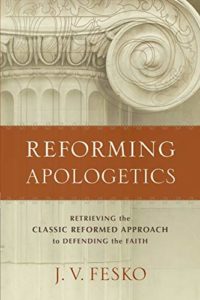 eforming Apologetics: Retrieving the Classic Reformed Approach to Defending the Faith (Baker, 2019)
eforming Apologetics: Retrieving the Classic Reformed Approach to Defending the Faith (Baker, 2019)
Challenging the dominant Van Tillian approach in Reformed apologetics, this book by a leading expert in contemporary Reformed theology sets forth the principles that undergird a classic Reformed approach. J. V. Fesko’s detailed exegetical, theological, and historical argument takes as its starting point the classical Reformed understanding of the “two books” of God’s revelation: nature and Scripture. Believers should always rest on the authority of Scripture but also can and should appeal to the book of nature in the apologetic task.
T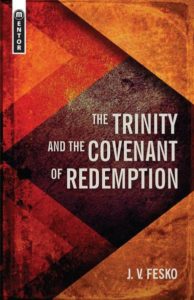 he Trinity and the Covenant of Redemption (Christian Focus, 2016)
he Trinity and the Covenant of Redemption (Christian Focus, 2016)
When Christians reflect on the gospel, their attention is rightly drawn to the cross and empty tomb. But is this it? Or is there much more to the story? In a ground-breaking work, J.V.Fesko reminds us that the great news of this gospel message is rooted in eternity, whereby a covenant was made between the persons of the Trinity in order to redeem sinners like you and me. J. V. Fesko, in the first of a three part series on covenant theology featuring Redemption, Grace and Works, aims to retrieve and recover classic Reformed covenant theology for the church.
D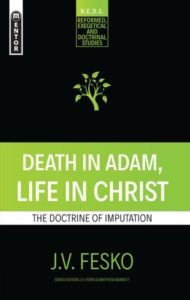 eath in Adam, Life in Christ: The Doctrine of Imputation (Christian Focus, 2016)
eath in Adam, Life in Christ: The Doctrine of Imputation (Christian Focus, 2016)
The doctrine of imputation is the ground in which salvation is rooted. It is often seen as superfluous or splitting hairs, and yet, without it, redemption automatically becomes reliant on our own works and assurance of salvation is suddenly not so sure. J. V. Fesko works through this doctrine looking at its long history in the church, its exegetical foundation, and its dogmatic formulation. In exploring imputed guilt from the First Adam alongside the imputed righteousness from the Second, this volume offers a helpfully well-rounded explanation of the doctrine.
J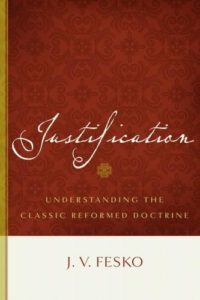 ustification: Understanding the Classic Reformed Doctrine (P&R, 2008)
ustification: Understanding the Classic Reformed Doctrine (P&R, 2008)
A comprehensive restatement of the classic reformed doctrine of justification by faith alone. This book explains the doctrine in terms of the ordo and historia salutis, as well as in the light of recent challenges. This book offers a defense of justification by faith alone while treating several theological traditions and current exegetical, theological, and ecumenical debates. It also includes discussion of the covenant of works, union with Christ, the New Perspective on Paul, Eastern Orthodoxy, and Roman Catholicism while displaying a pastor-scholar’s sensitivity to such important issues.
T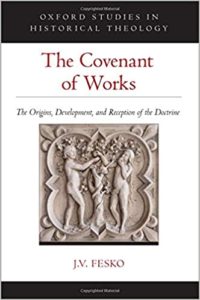 he Covenant of Works: The Origins, Development, and Reception of the Doctrine (Oxford University Press, 2020).
he Covenant of Works: The Origins, Development, and Reception of the Doctrine (Oxford University Press, 2020).
The Covenant of Works explores the origins of the doctrine of God’s covenant with Adam and traces it back to the inter-testamental period, through the patristic and middle ages, and to the Reformation. The doctrine has an ancient pedigree and was not solely advocated by Reformed theologians. The
book traces the doctrine’s development in the seventeenth century and its reception in the eighteenth, nineteenth, and twentieth centuries. Fesko explores the reasons why the doctrine came to be rejected by some, even in the Reformed tradition, arguing that interpretive methods influenced by
Enlightenment thought caused theologians to question the doctrine’s scriptural legitimacy.

